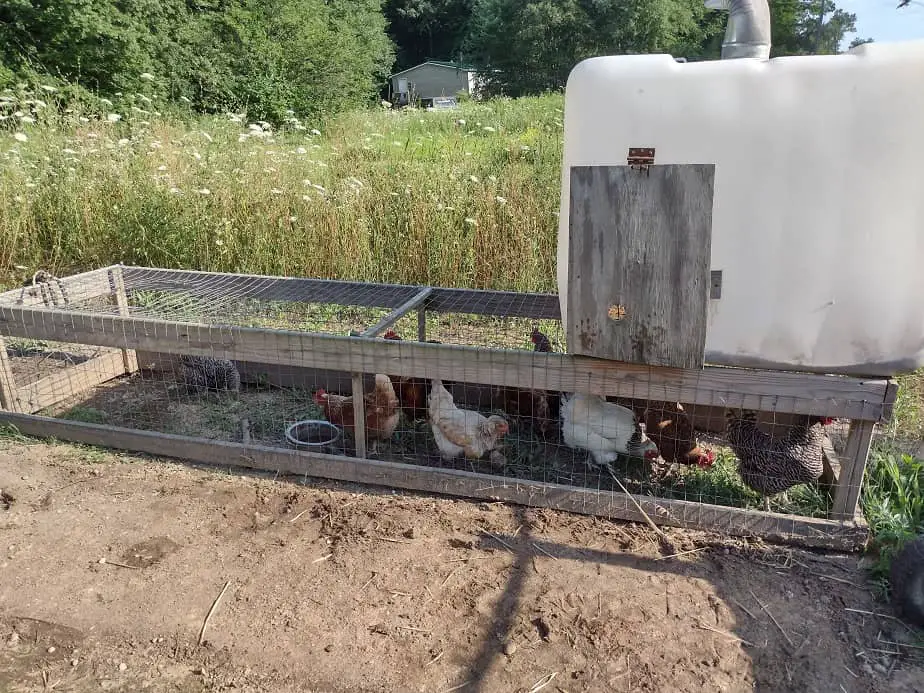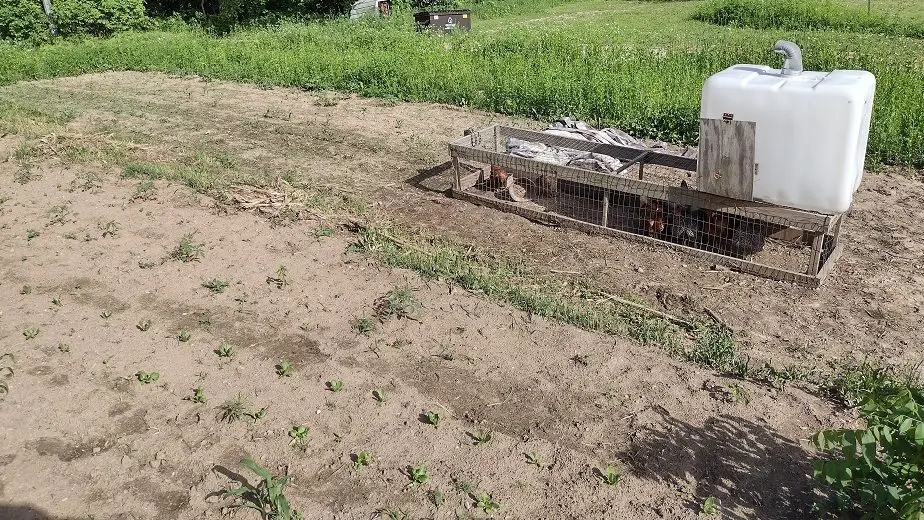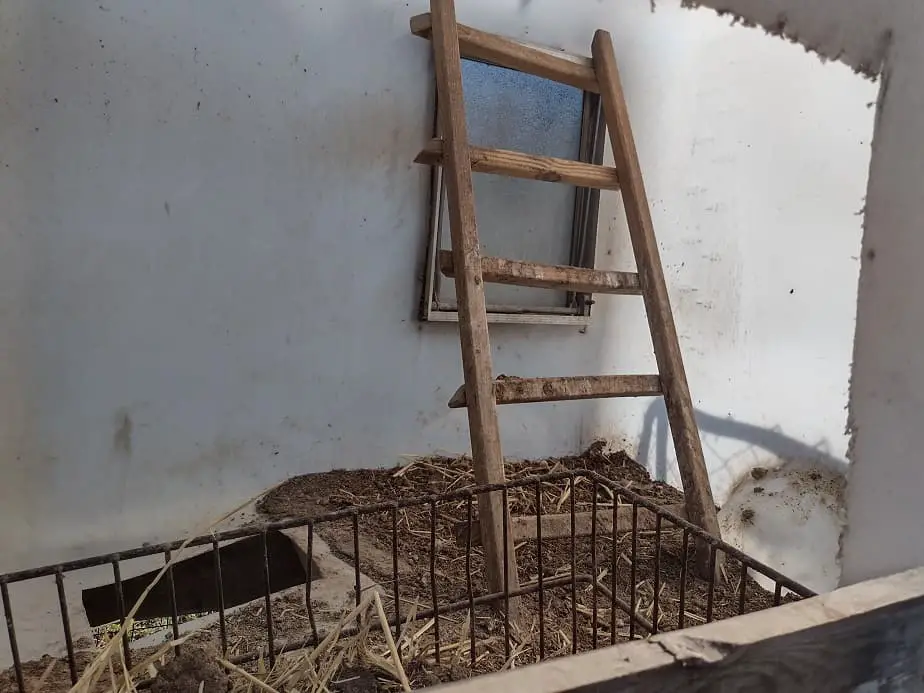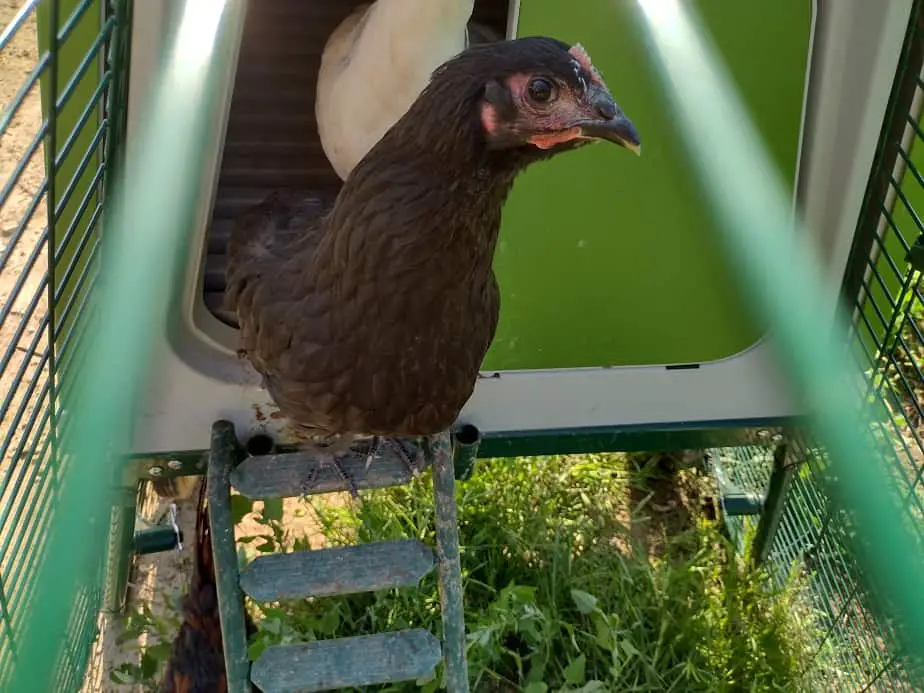We have chickens and a big garden. I’ve been experimenting with chicken manure for about 10 years now.
Chicken manure is very good for gardens. It is a very well-balanced, low-strength fertilizer as well as a soil conditioner. Chicken manure releases some of its nutrients quickly, and the rest is released slowly over 2-3 years. It can function as the sole fertilizer for most garden crops and helps build up the soil.
Some people say that chicken manure is too hot and can burn your plants, or that it has to be composted first. I’ll show you the methods I’ve put together from a decade of experience.
Will Chicken Manure Hurt My Garden?
Chicken manure will not usually harm gardens, but if used in large amounts it can cause fertilizer burns to tender plants. Fresh chicken manure is safe to use after the growing season, or during the growing season in proper amounts, as long as it’s not in direct contact with your plants.
I have been using fresh-from-the-coop chicken manure in and around my garden for years and have never seen even the slightest damage or burning from the manure. I know people who have experienced some damage.
Tender plants such as lettuce and spinach ( both are picked at a very young stage) are some of the most susceptible plants to the burning factor. How it happens is the same way that fertilizer “burns” a plant. It doesn’t actually burn, it draws moisture out from it, creating drought-like symptoms.
Poultry manure contains uric acid, which quickly converts into ammonium nitrate. Ammonium nitrate is a negatively-charged salt, so it draws water to it. By putting enough ammoniated manure (smells of strong ammonia) around a plant, you can actually reverse the water flow out of the plant.
There are four options to apply poultry manure and avoid all problems.
- Don’t apply it fresh, age/compost/dry it out.
- Water heavily after application to keep plants from drying out
- Apply it in the off-season, when there are no plants to hurt.
- Apply it very lightly.
I have never bothered intentionally aging or composting chicken manure. Sometimes, it does pile up before I do anything with it, but that’s not because I feel I have to let it sit first. My manure is never overly fresh. I clean out the chicken coop every few weeks or so, and it’s mostly old at that point.
Plus, it’s not full-strength manure. It’s usually full of straw, leaves, or other bedding. That waters it down more. I will generally fill up the wheelbarrow and use a hoe to chop up the large chunks. Then, I spread a bit (about a regular shovel full) of it between plants and water well. That’s always worked well for me.
I wouldn’t do that around very young pants or tender leafy plants. Another way is to make a slurry. Put a few shovels full in a bucket of water and mix well. It can then be scooped or poured into the garden. I do one of those two ways quite often.
If you wait till the fall, you can pile your garden full of manure and either let it sit over winter, or mix it in the soil. In biologically active soil, all the straw will be gone by planting time. You can also mix manure into the soil early in the spring. Composted manure is weaker but easier to work into the soil.

Using Chicken Tractors in the Garden
The bulk of our chicken manure is direct deposited in the garden by our chickens. We use chicken tractors, which are simple mobile pens without a floor. They usually create about 750 pounds of manure, which contains about 20 pounds of nitrogen. That’s half of the fertilizer needed for my 1/4 acre garden.
The trick is to get it in the right spot. I can’t run the chicken tractor down a row of plants because the chickens will eat the plants. Instead, I rotate the chickens down my beds in the off-season. During the growing season, I use the chicken tractors to fertilize the pasture and prepare new garden beds.
This technique had been a major part of rejuvenating the previously worn-out and barren land I live on. It’s really worked wonders and I suggest that others consider using a form of it or themselves.

Is Chicken Manure Safe in a Garden?
Let’s talk about safety concerns. There are some sanitary concerns about putting piles of bird poop in your garden soil. The main concerns are Salmonella and E. coli. Chickens can be full of them. More so on a high-grain diet and less so on a high-green diet.
To limit the issues of these disease-causing organisms, first, keep your chickens clean and healthy. Next, realize that these bacteria will be taken care of by nature. In a healthy environment, good bacteria will overcome and quite literally, cannibalize bad bacteria.
It may only take a few weeks in biologically active soil, but it takes longer in more sterile soil. Usually, 60 days is more than enough, but the USDA recommends a period of 90 days to account for biologically dead soils or other issues.
Basically, don’t use fresh manure shortly before harvesting anything that will be picked from the ground, like carrots or beets. I manured my tomato plants and two weeks later picked and rinsed the tomatoes well, but the USDA doesn’t like that.
When you apply fresh manure, you are drastically changing the biological structure of the topsoil for a short while. It needs a little time to get back to its healthy, clean normal state. Until then, treat it like a well-kept chicken coop floor.

Does Chicken Manure Need to be Composed?
Chicken manure does not need to be composted, but many people prefer it composted so it works into the soil in a smoother form. Composted chicken manure will cause less biological shock in your soil, but will lose some of the plant nutrients from the manure.
I haven’t bothered to compost any manures myself, we use them before they could sit that long. It usually takes 5 or 6 months to compost chicken manure, which isn’t long but I guess I’m not all that patient. I have bought several large loads of composted cow manure. The price was right.
The biggest benefit of composting chicken manure first is that it will have a smooth, fine particle consistency that will not plug up a rake or rototiller. If you want the smoothest soil possible, compost it first. For the most part, I don’t mind straw and stubble in my garden.

How Much Chicken Manure to Use?
High-quality chicken manure can be applied at a rate of 20-50 dry pounds per 100-row feet, depending on the crop you are growing and how fertile your soil already is. Most chicken manure is between 1 and 3 percent nitrogen and crops need 1/4 to 1/2 pound of nitrogen per 100-row feet.
I’ve put a lot of numbers together on manure application over the years and basically what it comes down to is, it depends. Depending on the nitrogen content in your manure, the soil structure, amount of rainfall, and how you manage it, it varies quite a bit.
A thing o remember is that the nutrients in manures are not all immediately available, Some is, but some is more like an investment that gives you a small return every year. First, consider how much fertilizer you have previously used, if any. How did that work for you? Was it enough, not enough, or too much?
I would probably start with around 10 gallons of chicken coop manure per 100 feet. Test your soil before applying manure, then again a month after to see how it’s responding. Add more from there if you need. Keep notes on how much you added, and the soil test results. Also, note if the plants seemed happy.
To test the soil, I strongly recommend the LusterLeaf 1602 soil test kit. It’s cheap and works the best of them all. it also comes with basic fertilization recommendations for garden crops. Learning to adequately use manures in your garden takes observation, and trial and error to learn. It’s an art.
It’s not hard, it’s just that there are a lot of factors at play and your specific soil will work and respond differently with manures than my soil does.
Chicken Manure Pellets vs Fresh Manure.
Pelleted chicken manure is stronger than fresh manure but clean and completely safe around plants. It can be expensive. Pelleted chicken manure is usually 3 to 4 percent nitrogen, and can be applied very evenly. Because the NPK is listed, it’s very easy to calculate the proper amounts needed.
Low-feeding crops use around 1/4 pound of nitrogen per 100-row feet. Heavy feeding plants use about 1/2 pound of nitrogen per 100-row feet. If you buy a bag of pelleted fertilizer, you can use a calculator and scale to determine just how much you should apply to your garden.
If you plan to use pelleted manure as the primary fertilizer, you will probably need to apply 25 to 50 percent extra for the first few years in order to build up the soil to a natural fertile state. Just be sure to conduct a soil test at least every spring and fall to see how it’s doing for you.
Related articles:

